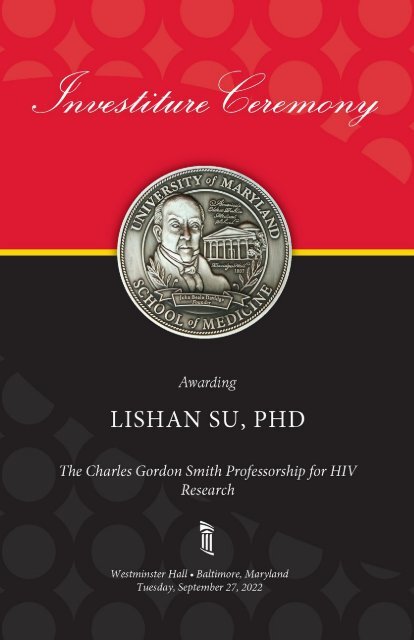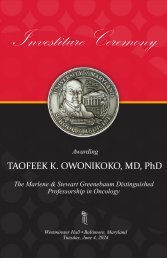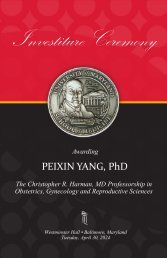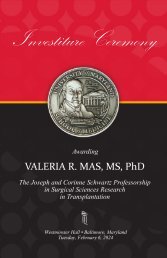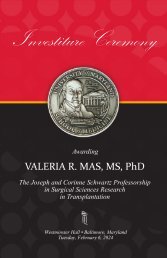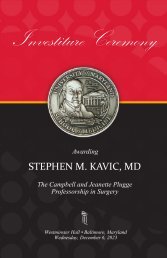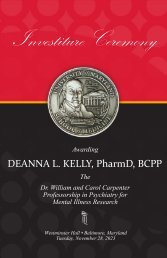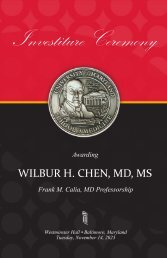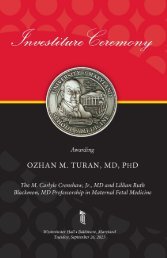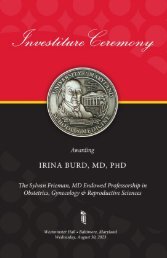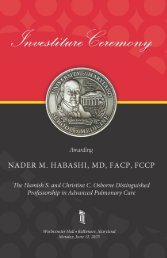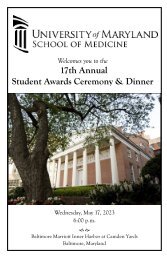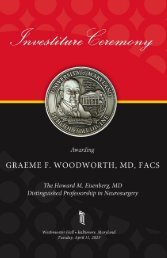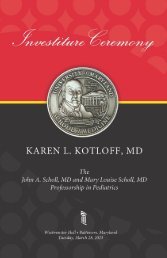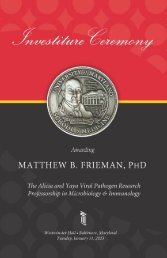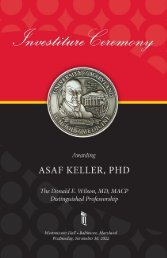Lishan Su, PhD Investiture Program
You also want an ePaper? Increase the reach of your titles
YUMPU automatically turns print PDFs into web optimized ePapers that Google loves.
LISHAN SU, PHD<br />
of North Carolina-Chapel Hill.<br />
<strong>Lishan</strong> <strong>Su</strong>, <strong>PhD</strong> grew up in Qingdao,<br />
China, and received his BS in Microbiology<br />
from Shandong University, <strong>PhD</strong> in Virology<br />
from Harvard University, and did postdoctoral<br />
training in Immunology at Stanford<br />
University. Dr. <strong>Su</strong> then worked as a<br />
research scientist in a biotech company,<br />
focusing on HIV pathogenesis and testing<br />
blood stem cell-based HIV-1 gene therapy<br />
in HIV-infected patients. From 1996 to<br />
2021, he was a faculty member in the<br />
Lineberger Comprehensive Cancer Center<br />
and Professor in the Department of<br />
Microbiology & Immunology at University<br />
For over two decades, Dr. <strong>Su</strong> has focused on studying several critical areas<br />
of immuno-pathology of human chronic virus infections, particularly on<br />
elucidating how HIV causes AIDS-related diseases. The <strong>Su</strong> laboratory<br />
studies how HIV-1 and HBV interact with human immune cells to cause<br />
diseases. His research team has focused on the plasmacytoid dendritic cell<br />
(pDC)-interferon axis in the pathogenesis and therapy of chronic HIV<br />
infection and Disease-Associated Macrophages (DAM)-hepatic stellate cells<br />
in HBV-induced liver diseases in humanized mice and in patients. The team<br />
has also started investigation of the pathways in tumor microenvironments<br />
(TME) and in cancer immune therapy. After joining The Institute of Human<br />
Virology at UMSOM, Dr. <strong>Su</strong> continued his research program to use HIV and<br />
HBV viruses as probes to dissect human immunity and inflammatory<br />
diseases, and to develop antibody and cell-based drugs targeting novel<br />
immune cells and signaling pathways to treat human inflammatory diseases<br />
including virus infection and cancer. He has also trained over 40 postdoc/<br />
visiting scholars and 20 graduate students from 8 different countries.<br />
Dr. <strong>Su</strong> has served on grant review committees for US/European and Chinese<br />
funding agencies for over 20 years, and as associate editor or on editorial<br />
boards of several journals. For the past 20 years, Dr. <strong>Su</strong> has also interacted<br />
with US and international institutions, including providing advice and to<br />
evaluate progress to biomedical research institutes and centers. He has also<br />
received several awards over the years, including election as a Fellow of the<br />
American Association for the Advancement of Science in 2012, and the<br />
Charles Gordon Smith Endowed Professorship for HIV Research in 2021.
WELCOME<br />
Mary Pooton<br />
Associate Dean for Development<br />
University of Maryland School of Medicine<br />
Margaret M. McCarthy, <strong>PhD</strong><br />
The James and Carolyn Frenkil Dean’s Professor and Chair,<br />
Department of Pharmacology<br />
Director, <strong>Program</strong> in Neuroscience<br />
University of Maryland School of Medicine<br />
REMARKS<br />
Mark T. Gladwin, MD<br />
Vice President for Medical Affairs, UM Baltimore<br />
John Z. and Akiko K. Bowers Distinguished Professor and<br />
Dean, University of Maryland School of Medicine<br />
DONOR RECOGNITION<br />
Mark T. Gladwin, MD<br />
SPEAKERS<br />
Robert C. Gallo, MD<br />
The Homer and Martha Gudelsky Distinguished Professor of Medicine<br />
Co-Founder & Director, Institute of Human Virology (IHV)<br />
University of Maryland School of Medicine<br />
Mike McCune, MD, <strong>PhD</strong><br />
Head, HIV Frontiers Initiatives<br />
Bill & Melinda Gates Foundation<br />
Yang Liu, <strong>PhD</strong><br />
Chief Executive Officer & Chief Scientific Officer<br />
OncoC4 Inc.<br />
Mark Bonyhadi, <strong>PhD</strong><br />
Senior Advisor<br />
Qiming Venture Partners USA<br />
MEDAL PRESENTATION<br />
Mark T. Gladwin, MD<br />
REMARKS<br />
<strong>Lishan</strong> <strong>Su</strong>, <strong>PhD</strong><br />
The Charles Gordon Smith Professor for HIV Research<br />
CLOSING REMARKS<br />
Margaret M. McCarthy, <strong>PhD</strong>
T<br />
he first endowed professorships were established more than<br />
500 years ago with the creation of the Lady Margaret chairs<br />
in divinity at Oxford and Cambridge Universities. The<br />
original endowed chairs were sponsored by Lady Margaret,<br />
countess of Richmond, and grandmother of Henry VIII in 1502.<br />
<strong>Su</strong>bsequently, private individuals began making financial contributions<br />
to establish other endowed professorships and chairs such as the<br />
Lucasian Chair of Mathematics, which Sir Isaac Newton held beginning<br />
in 1669. Professor Stephen Hawking, the internationally renowned<br />
physicist and recipient of the 2010 US Medal of Freedom, was another<br />
prominent holder of this endowed chair.<br />
The honor associated with appointment to an endowed position has<br />
remained unchanged for the last 500 years and is recognized as one of<br />
the highest tributes that an academic institution can bestow upon its<br />
most distinguished faculty. These endowed professorships and chairs<br />
continue to reward exceptional scholars uninterrupted to the present<br />
time.<br />
The Office of Development is charged with securing private gifts to<br />
ensure the School’s tradition of excellence is sustained through robust<br />
research, clinical, and educational programs and initiatives. The<br />
University of Maryland School of Medicine is fortunate to have nearly<br />
85 endowed chairs & professorships in various stages of completion<br />
and held by esteemed faculty members.
CHARLES GORDON SMITH<br />
Charles Gordon Smith of Fort Lauderdale, FL, cemented his own legacy<br />
in the advancement of virological research for years to come, with an<br />
endowed professorship at the University of Maryland School of Medicine’s<br />
(UMSOM) Institute of Human Virology (IHV) that now bears his name.<br />
His bequest, partially matched by Maryland E-Nnovation Initiative Fund<br />
(MEIF), created the Charles Gordon Smith Endowed Professorship for HIV<br />
Research.<br />
Smith’s posthumous gift was inspired by a June 2001 appearance on CNN<br />
by IHV director and co-founder Robert C. Gallo, MD, the Homer and<br />
Martha Gudelsky Distinguished Professor in Medicine and co-founder and<br />
director of IHV, which highlighted Gallo’s work to detect and treat HIV,<br />
the virus that causes AIDS. The interview sparked Mr. Smith’s growing<br />
interest in Dr. Gallo’s work and eventually, his desire to fund HIV research<br />
through his bequest.<br />
Mr. Smith was a staff accountant at Price Waterhouse and was described by<br />
friends as very scholarly with multiple degrees, an avid reader, and book<br />
collector with multiple interests who researched everything.<br />
“Charlie was a philanthropist and wanted to help so many,” noted a close<br />
friend of Mr. Smith, who requested anonymity. “Dr. Gallo had made an<br />
impact for Charlie, as much as Charlie is now making an impact for Dr.<br />
Gallo.”<br />
The E-Nnovation program was created as an economic stimulus in 2014, as<br />
a special non-lapsing fund designed to help the state’s research universities<br />
recruit and retain top scientists and investigators. Administered by the<br />
Maryland Department of Commerce, MEIF funds combined with private<br />
philanthropy from Mr. Smith’s estate, has allowed the creation of this new<br />
endowed professorship.<br />
UMSOM is very thankful for this bequest from Mr. Smith that has allowed<br />
us to appoint the inaugural Charles Gordon Smith Endowed Professor of<br />
HIV Research.


